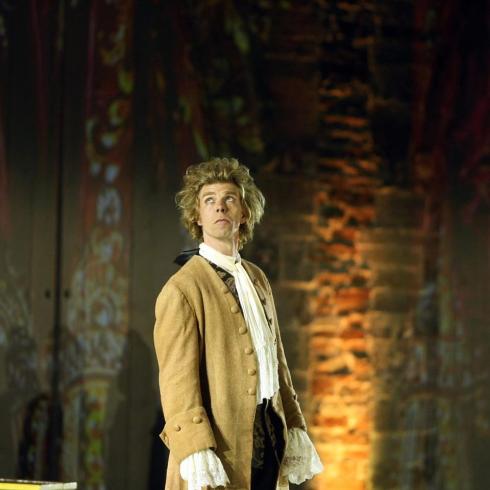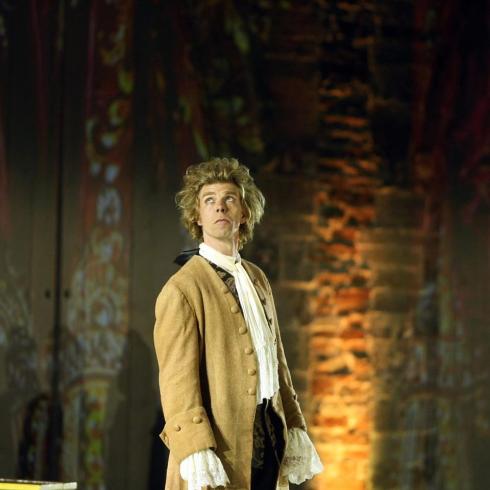The play is set in 1781s Vienna, at the Imperial court of the Habsbourgs, at a time when the Austro-Hungarian Empire is ruled by an Emperor particularly interested in the fine arts. Joseph II makes sure that at his court composers benefit of a certain esteem: they’re the servants of nobility, “while first the servants of the divine”, and amongst them, Antonio Salieri is the undisputed favorite.
This is a court imbued with etiquette, most-educated and determined to keep mediocre intrusions at bay; all the more reason to be taken by storm by a young German composer, without the merit of a fine education, but with a compelling talent: Wolfgang Amadeus Mozart.

Denis Carpentier as W.A.Mozart
Mozart’s prodigal emergence amongst the most talented of his time is not applauded by all: some of the more conservatorist noblemen and established composers are taken aback by the young man’s vulgar ways, while others acknowledge and begrudge his talent…
There’s a quintessential romantic idea that the human being is only briefly possessed by genius and that the perfect gift of such divine inspiration is too much for its frail, brutish and imperfect nature.
It is this very same idea that Peter Schaffer used when constructing “Amadeus”, the tale of a young Mozart that is as imperfect in life as he is prodigious in music. The more his mortal shell declines, the higher his spirit elevates, and the cleaner and clearer his music.
As creators and witnesses of artistic creation, we too, cling on to the archetype of transcendence of spirit through weariness of body. Suffering seems to deem the bearers worthy of their truest selves, and discipline through pain seems to alleviate the transgression. But in Schaffer’s rendering of the brief life of Mozart, the composer is depicted as a man that is too young to know, to understand discipline: “I always speak too much, that is why my dear father used to tell me that it is best if I simply shut up instead”.
Schaffer’s depiction shows a Mozart that isn’t a virtuous man: he comes to Vienna on the wings of a fulgurating success, and is apparently overwhelmed by the city’s promise of High Court favors, self-infatuated and drunk with public acclaim. He marries outside of his class and without his father’s consent; he ignores society norms and is, often times, vulgar. These imperfections, the blatant lack of discipline and respect, combined with a talent that makes composers think he is “the voice of God” infuriate Salieri, a most esteemed musician at the Emperor’s court.
Salieri is envious: he labored his whole life to reach a place of immortal greatness, only to understand that Mozart, apparently without much effort, naturally outshines him. Infected by hubris, he plots the young man’s demise: he attempts to seduce his wife, shatters his career at the Emperor’s Court, and finally renders Mozart pauper and ill.
All throughout his scheming, Salieri believes that the more he tries to silence Mozart, the more he angers God, he shows fear, at times remorse, but thinks he cannot stop: not until God bestows upon him at least a crumble of the talent he so generously lavished on Mozart. And when God fails to do so while time and time again allowing Mozart’s compositions to sing with angelic voices, Salieri becomes determined that his real enemy isn’t this mortal boy, but the God he so selflessly served without an ounce of gratitude in return. He becomes possessed by the idea of an indifferent God, and decides to “steal” the divine gratitude he was not granted, by antagonizing his earthly protegé, so that when Mozart’s music will soar over the ages, and when hearing it “they’ll speak the name of God in delight, they’ll add that of Salieri, in disgust.”
Helas, he understands too late that in fact his immortality, stolen this way and not bestowed upon, is finally granted only under the auspice of mediocrity.
For a glimpse of Peter Schaffer’s final draft of Amadeus look no further than here.
***
a Romanian version of this review can be found here.

